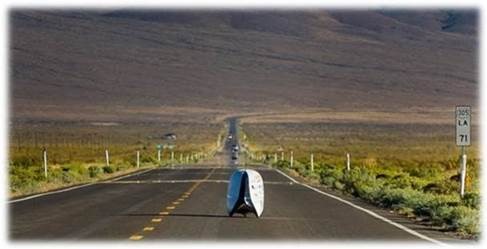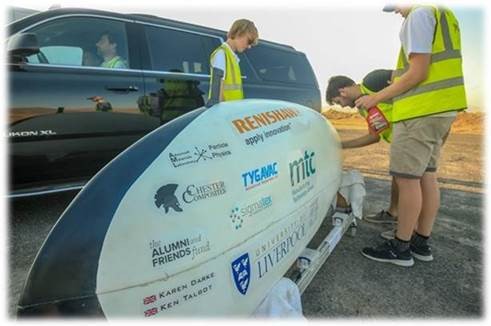Liverpool Physics and the World Human Powered Speed Challenge

You may recently have read about the astounding success of the Liverpool team and the World Human Powered Speed Challenge in northern Nevada; in which the team set no fewer than four world records in their faired handcycle; the ARION4.
The team is one of the Capstone projects, undertaken over the final two years of the MEng Mechanical Engineering degree. The aim of which is to design, build and test a product – in this case, a record beating hand cycle.
As an undergraduate, Kieran Bridges, a member of the physics department, was a member of the ULV Team; building the ARION2. He continues to act as a mentor to the student teams to fulfil IMechE professional development requirements and as such, he was lucky enough to travel out with the team on their record breaking trip to the desert. The department has strongly supported the ULV Team, particularly through Peter Cooke in the Advanced Materials Laboratory; who has assisted the team for a number of years in devising a suitable wet layup strategy for the aerodynamic shell as well as providing a post curing facility using the large composites oven located in the workshop.
The female handcyclist Karen Darke initially achieved a speed of 41.86 mph over the 2.5 mile course, 17 mph (!) faster than the previous female world record. She raced again on the 14th September; breaking her own record twice with a final speed of 46.54 mph, faster than the original male world record.
Ken Talbot, Liverpool's male rider, first recorded a speed of 42.37 mph, breaking the British male hand cycle land speed record. A further attempt saw him break the male world record by over 6mph; reaching a speed of 51.86 mph, in the process becoming the first hand cyclist to ever go over 50 mph.
The team went on to set two more world records on the 600m short track; a test of acceleration. With Karen achieving a speed of 30.3 mph and Ken Talbot reaching 33.81 mph.

Running student projects of this scope and ambition would not be possible without close inter-departmental collaboration and the physics department is proud to have contributed to this fantastic result. The production of the ARION5, a leg powered trike is already underway, and the team will be travelling back to the Nevada desert in September 2019 to attempt the leg powered record, currently at 73.95 mph for a male and 54.45 mph for a female rider.